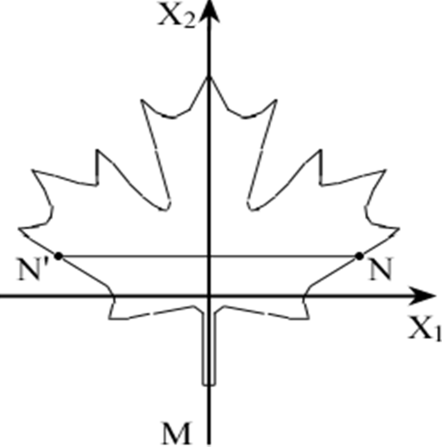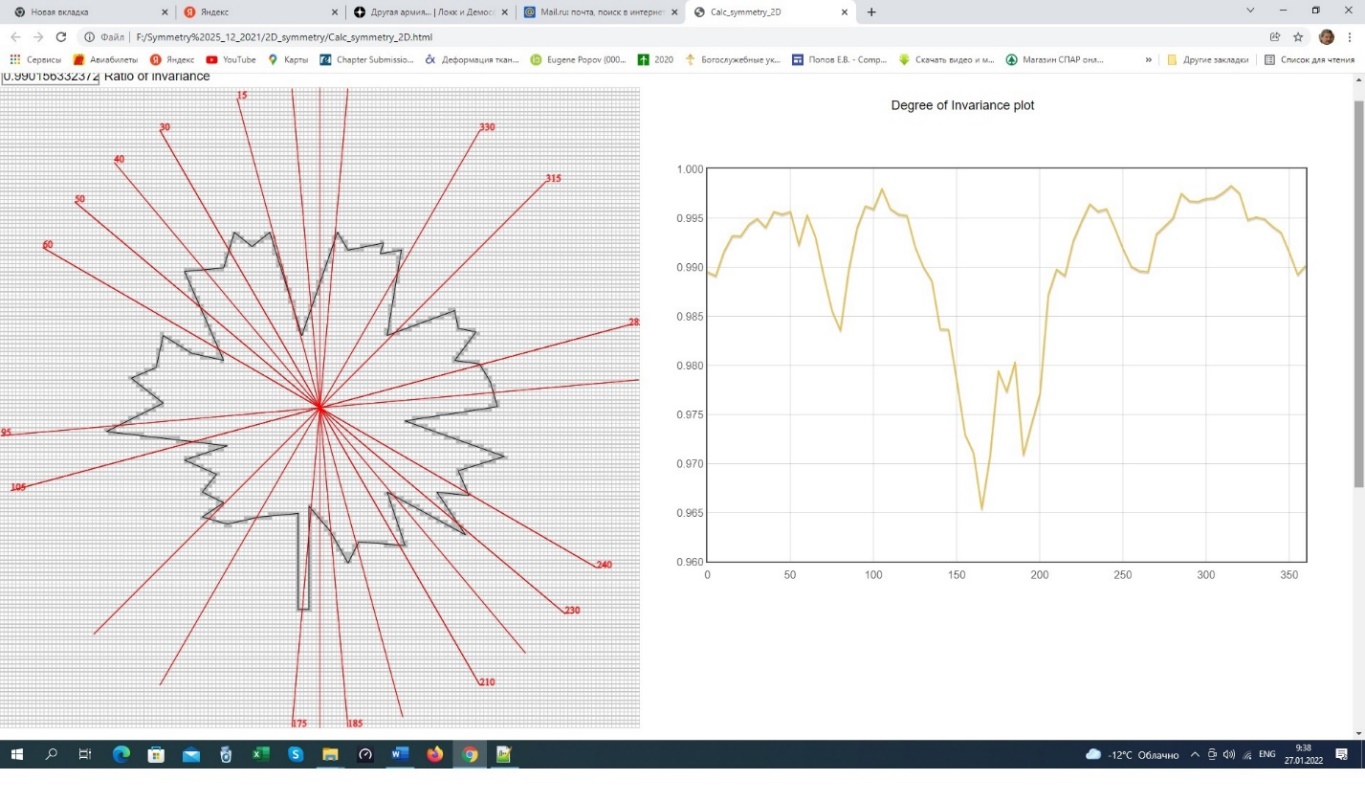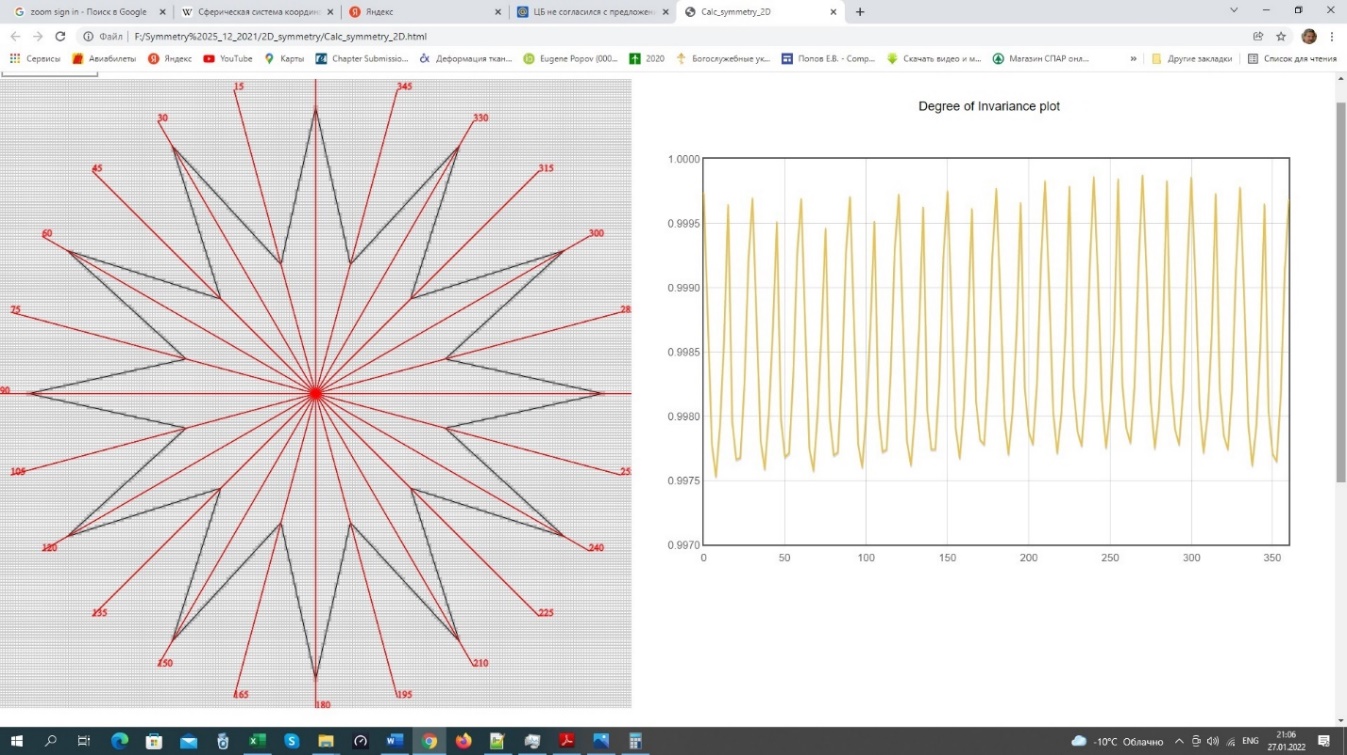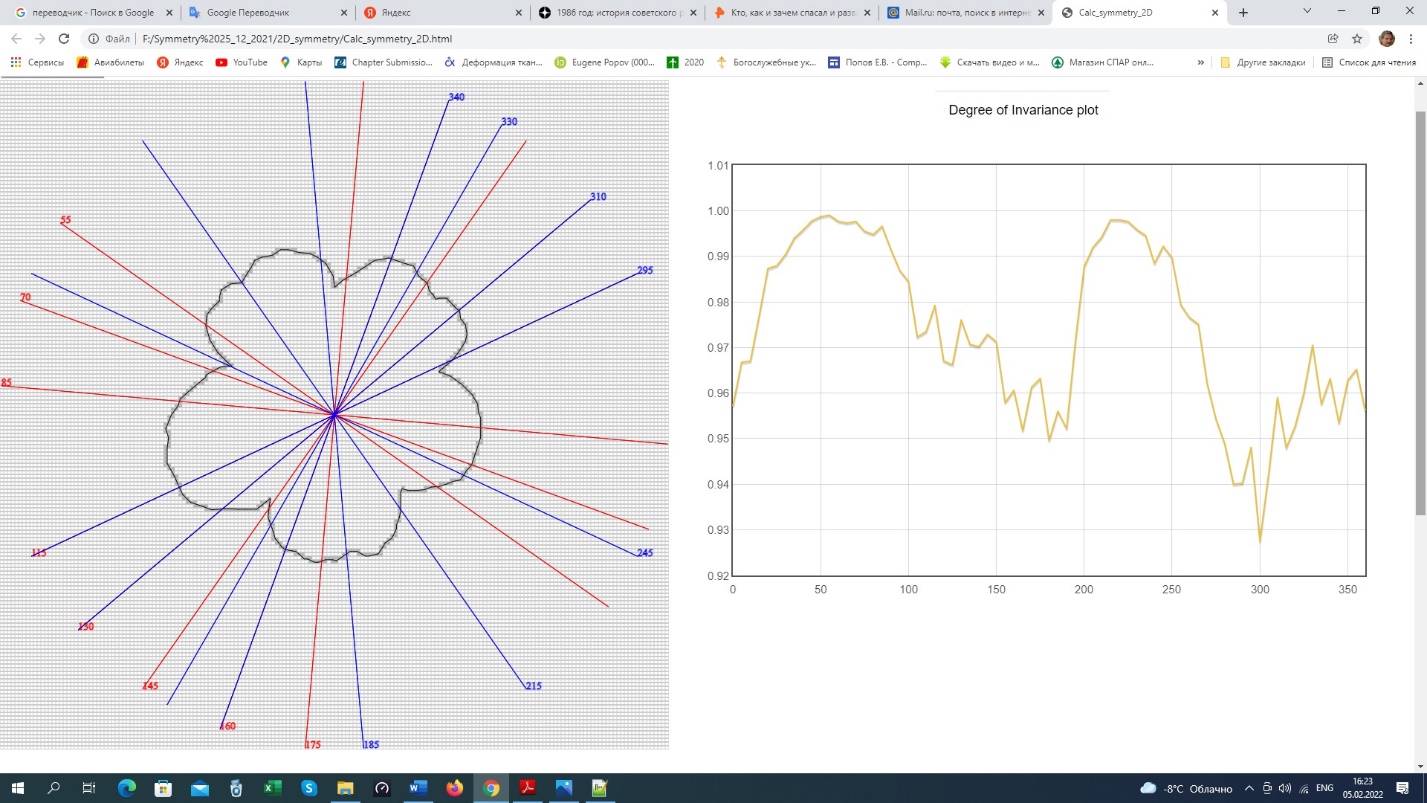Symmetry
is
the property of remaining invariant under certain changes (as
of orientation in space, of the sign of electric charge, of parity, or of the direction
of time flow)
—
related to physical
phenomena and of equations describing them [1].
Symmetry
is observed everywhere in wild life, but biological objects, as a rule, are not
perfectly symmetrical, but approximately only. Therefore, they are also called pseudosymmetric.
Nevertheless, a living object can be characterized by a certain type of symmetry,
along with other morphological, physiological, genetic and other features, according
to which we distinguish one organism from another [2,3].
One of the
fundamental problems of biology is to distinguish between the variability of shapes
and sizes of morphological objects. In biology, there is a geometric continuum vision
of organisms as integral forms. The laws of physique of organisms are embodied not
only in external form, but also in structural elements: organs, cells, macromolecules,
which are called biomorphs in biology. Moreover, each of the biomorphs is not only
endowed with its own symmetry, but is also connected by a symmetry relationship
with other biomorphs. This vision of biomorph represents the traditions of geometry
in biology, and the corresponding section of biology called biosymmetry [4].
Symmetry should be considered as
an immanent dualistic characteristic of a biological object, which inevitably
manifests itself in ontogenesis. Methods for its calculation were developed as
a special analytical tool for solving the fundamental problem of biological
research - the distinction between the variability of the shape and size of
biological objects. If the methodological significance of symmetry in biology
and ecology is beyond doubt, then the methods for quantitative assessment of
symmetry degree of biological objects remain a field for discussion [2], [4].
Consider
the problem of invariance degree of a finite object determining with respect to
various isometric transformations from the set theory point of view. Let us describe
such an object by a function of three variables
f(x1,
x2,
x3) integrable in a limited range of its
arguments. Then we can take into consideration the invariance degree of this function
with respect to some operator
g’
of
x1,
x2,
x3
coordinate transformation. The value that gives the numerical
value of the invariance degree with respect to the coordinate transformation must
be a number that is assigned to each function, i.e., should be functional. In this
case, the functional should change from –1 to +1. The value +1 should correspond
to the case when the function
f(x1,
x2,
x3) is completely invariant (symmetric) with respect to the given
operation
g’, the value -1 should correspond to the case when
the function
f(x1,
x2,
x3)
is completely antisymmetric with respect to the operation
g’. Thus, the invariance
degree of the real function
f(x1,
x2,
x3) with respect to some transformation
g’,
we mean the functional
ηg’
in the form of the following convolution
(see work [2])
|

|
(1)
|
Here we
integrate over the entire area
 where function
f(x1,
x2,
x3) is defined. This convolution depends
on the type of function
f(x1,
x2,
x3),
and on the type of operation
g’. If the arguments domain is the entire set
of real numbers and the function is a constant, then
where function
f(x1,
x2,
x3) is defined. This convolution depends
on the type of function
f(x1,
x2,
x3),
and on the type of operation
g’. If the arguments domain is the entire set
of real numbers and the function is a constant, then
 1. If the operation
g’
is a single transformation,
then
1. If the operation
g’
is a single transformation,
then
 1 as well, regardless of the form of the function
and the scope of its arguments.
1 as well, regardless of the form of the function
and the scope of its arguments.
Let us take
into account the case when function
f(x1,
x2,
x3) is not a constant or where the domain of its arguments differs
from the set of all real numbers. If
f(x1,
x2,
x3) is invariant completely with the argument’s transformation,
which is described by the operator
g’, then
 and, therefore
and, therefore
 1. If
f(x1,
x2,
x3) is antisymmetric with respect to the given transformation,
then
1. If
f(x1,
x2,
x3) is antisymmetric with respect to the given transformation,
then
 -
1. If
-
1. If
 0,
then we
can assume that the function is completely asymmetric with respect to transformation
g’.
In fact, this
means that there is no single corresponding element of the structure under
consideration both on one side and on the other side with respect to the
symmetry agent (plane, axis, etc.)
0,
then we
can assume that the function is completely asymmetric with respect to transformation
g’.
In fact, this
means that there is no single corresponding element of the structure under
consideration both on one side and on the other side with respect to the
symmetry agent (plane, axis, etc.)

Figure
1. Woody leaf in regard to the symmetry axis M
Let us describe
the application of convolution (1) to determine the 2D object degree of symmetry.
As an example, consider a bilaterally symmetrical object, such as a leaf (see Fig.1).
Let us introduce the function
f(x1,
x2),
which is equal to 1 at the points located on the surface of the leaf, and is equal
to zero at all other points. We choose the axes of the orthogonal coordinate system
so that the X
1
axis is perpendicular to the symmetry axis M and the origin
lies on this axis (Fig.1). Then the bilateral operation in M axis transforms a point
N
with coordinates (x1,
x2) into a point
N’
with coordinates (-x1,
x2). In our
case of an absolutely symmetric leaf the values of the function at these points
are non-negative and equal to each other
|
f(x
1,
x2) =
f(-x1,
x2).
|
(2)
|
Then the
integral
 over all points of the leaf surface
over all points of the leaf surface
 is
numerically equal to its area. The same value is equal to the integral in the denominator
of expression (1)
is
numerically equal to its area. The same value is equal to the integral in the denominator
of expression (1)
 , so that for an absolutely symmetrical leaf
we get
, so that for an absolutely symmetrical leaf
we get
 .
.
In the vast
majority of 2D cases, when complex objects are not completely symmetrical, it is
impossible to calculate the integrals analytically. Therefore, the image of the
object is preliminary rasterized and replaced by a set of pixels. In this case we
can take into account the set of pixels at the contour of the object image and modify
the convolution relation by the function
f(x1,
x2)
as follows. Let the value of the
j-th
attribute of a given object be equal to
Ljr
to the left of the axis
M
in some
r-th region (cell) of the partition, and
Rjr
in the symmetrically
located region to the right of
M, respectively. Then the degree of invariance
of the object according to the
j-th attribute relative to the axis
M
will be written in the form [3, 5, 6]
|

|
(3)
|
Here
m
is the number of pixels in the object rasterization to the left and right of the
M
axis.
The
described group-theoretic approach allows us to create the program for the numerical
estimation of the pseudosymmetry of various nature objects both in 2D and in 3D
case.
In 3D case,
the input data is an object geometry file in STL format. This geometry can be obtained
either by generating geometry by any 3D geometric modeling system, or by 3D scanning
of real objects with subsequent data conversion to STL format. The output data of
invariance degree are a 3D table containing the calculated values depending on zenith
and azimuth angles of the spherical coordinate system. This table allows obtaining
the set of pseudosymmetry planes of an object.
The input
data in 2D case is an array of coordinates of the vertices of a closed polyline
representing the contour of an object. The program initially decomposes the given
polyline into a raster, and then calculates the invariance degree (Fig.2). The invariance
degree is calculated by formula (3), where
Ljr
and
Rjr
are the raster
coordinates
X
of the
Left
and
Right
pixels in
Fig. 2.
Further,
the polyline is rotated by a given angle relative to the coordinate system and the
process is repeated anew. The program calculates the invariance degree of the object
contour depending on the angle of its rotation relative to the axes of the given
coordinate system. The value of the invariance degree varies from 0 to 1 depending
on the angle of rotation. Value 1 corresponds to exact symmetry, 0 means no symmetry
at all. The local maxima of the invariance degree make it possible to determine
the direction of the pseudosymmetry axes of the object contour.

Figure
2. Scheme to apply formula (3) in 2D case
As a test
example we consider the problem of determining the axes of invariance of a tree
leaf (Fig.2). The leaf has an artificial shape, built in K3 CAD system.

Figure 3.
Test sample with invariance plot and pseudosymmetry axes
Fig.3 shows
a plot of the leaf invariance degree calculated by formula (2), depending on its
rotation angle relative to the coordinate system. The left part of Fig.3 shows the
axes of invariance corresponding to all local maxima in the graph on the right.

Figure 4.
The bilateral pseudosymmetry axes of a 12-ray star
The following
example refers to the calculation of the invariance degrees of a 12-ray star, which
is a regular geometric figure. Fig.4 shows the axes of bilateral pseudosymmetry
according to local maxima in the graph on the left side of Fig.4. As can be seen
in Fig.4, there are 24 such maxima, the bilateral symmetry axes pass both along
the tops of the rays of the star and along their troughs.
This obvious
example fully corresponds to a similar example in the work [4, 6] and confirms applicability
of the developed approach to estimation of pseudosymmetry axes position in 2D.
Another
example concerns the evaluation of symmetry degree of the zygomorphic flower corolla
(Fig. 5). The symmetry axes position of this figure is studied in detail in works
[4] and [7]. Moreover, in work [4] one axis of symmetry was found, and in work [4]
- five. In our study, we found 12 axes of symmetry, among which five coincide with
the axes in [4], i.e., axes at 70°, 145°, 185°, 215°, 295°.
The raster
density in our case was equal to 180
×
180, and the pitch
of the contour rotation angles was 10°.

Figure
5. The corolla of a zygomorphic flower pseudosymmetry
The study
of the pseudosymmetry of a 3D object using computer technology requires the presence
of a model of this object in the computer memory, obtained in one way or another.
One way to obtain 3D object model is to develop it by any CAD system. The main disadvantage
of this way is the requirement of good user skills in geometric modeling and the
ability to create object models as accurately as possible. Another way to create
3D models is scanning. In this case, there is a real opportunity to obtain the most
accurate and adequate model of a natural or man-made object. The output information
of 3D scanning is a cloud of points in the coordinate system of the scanner working
space, belonging to the surface of a real object. The standard software of most
3D scanners provides the transformation of this point cloud into a surface model,
represented as a triangle grid that can be output in STL format.
For instance,
Figs. 6 and 7 show scanned models of two biological objects, namely the starfish
Crossaster papposus
and skull of
Ondatra zibethicus. We used these
models as samples of our calculation.
Work [4] describes
the program Symmetry 3D, which allows obtaining initial 3D surface of an object
and calculating its pseudosymmetry. When using this program, the main problem is
the object representation in the form of a set of 3D elements -voxels, which
(according to the authors’ opinion) is convenient for studying the symmetrical characteristics
of 3D object. However, it should be noted that the
space
decomposition into a 3D raster and the voxelization of an object leads to the fact
that the pseudosymmetry calculation becomes unreasonably expensive in terms of computer
resources.
The fact is that 3D raster with poor density
can lead to the situation when the characteristics of a 3D object with complex shape
will be determined too roughly. For example, it is recommended to use a cubic
volume, the size of which lies in the range 50–1000, for example,
100×100×100. An attempt to refine the 3D raster density will lead to
an increase in computational costs in a cubic dependence and may make the result
unattainable in a reasonable time and at a reasonable cost under Windows
XP/Vista/7/8/8.1/10 (64-bit).
This circumstance forces the authors of the program
to use parallel computing technologies with multi-core systems and specialized graphics
cards.
In
this study we developed a new approach based on an original object 3D model represented
in STL form directly. The approach also applies expression (1) and its modification
(3) to the numerical DoI (degree of invariance) calculation of 3D object for an
arbitrary isometric transformation.
The main
idea here is to extend the approach to applying relation (3) according to the scheme
in Fig. 2 for 2D case to 3D case. However, it should be borne in mind that in the
3D case we have abandoned the 3D raster concept.

Figure 6.
3D model of starfish
Crossaster papposus

Figure 7.
3D model of
Ondatra zibethicus
skull

Figure 8.
Scheme to apply formula (3) in 3D case
We replaced
the raster with a package of lines parallel to each other and to X axis in such
a way that when they cross the object, they form a set of intersection points (see
Fig.8), the coordinates at X axis of which we then insert into formula (3). Obviously,
in this case, the DoI is relative to the coordinate plane YZ. The accuracy of DoI
calculation depends on the number of points, which, in its turn, hinges on the number
of straight lines. The higher the line density, the higher the DoI accuracy. We
studied the effect of line density for this accuracy, which showed that the number
of lines of 40
×
40 relative to the YZ plane is quite sufficient
for most calculations. An increase in the density of the line packet does not lead
to a noticeable increase in the accuracy of DoI, but increases the calculation time
according to a quadratic law.
The program
calculates DoI at different orientations of the model relative to the coordinate
system. The model cyclic rotation with respect to two zenith and azimuth angles
of the spherical coordinate system is organized (angles
α
and
b,
see Fig.9)
with unchanged position and direction of auxiliary straight lines (Fig.8). The output
is a table of numerical DoI values at
zenith
and azimuth
angles.

Figure 9.
Spherical co-ordinate system
When
calculating DoI the following parameters were given: the changing steps zenith
α
and azimuth
β
angles were taken to be the same and equal
to 15°.
The auxiliary
straight-line density was limited in value 40
×
40.
The local maxima finding is a consistent comparison of the DoI values
at each table element with the DoI values at the neighboring nodes surrounding it.
A similar approach was described in work [8]. In our case there are 8 such neighboring
nodes. If this value is the largest one, then one can consider this value as a local
maximum.
According
to the output table we can build a plot in the form of NURBS surface represented
in Figs. 10 and 11 for both our models where one can also see the position of local
maxima as red points.
The
local DOI maxima corresponds to the positions of the pseudosymmetry planes of each
of the two objects. For example, Fig. 12 shows all the planes found for the muskrat
skull. Figs.13 and 14 show the planes of pseudosymmetry of objects, corresponding
to DoI
maximum maximorum. We call them general bilateral symmetry planes.
DoI values are given on these planes as textures.
In
both cases, the found planes of bilateral pseudosymmetry quite obviously confirm
the high efficiency of the developed approach to calculation of the DOI as in the
case of 2D, and especially in the case of 3D

Figure
10. DoI surface of skull in unfolded spherical system with local maxima

Figure 11.
DoI surface of starfish in unfolded spherical system with local maxima

Figure 12.
The entire set of local pseudosymmetry planes for the skull

Figure 13.
General bilateral symmetry plane of skull

Figure 14.
General bilateral symmetry plane of starfish
We
have
created
the program for the numerical estimation of the pseudosymmetry of
various nature objects both in 2D and in 3D case on the basis of JavaScript
language and CSS introduced to HTML5 code. We have chosen such a platform
guided by considerations of ease coding and the program platform independence.
In 2D case the program uses two libraries in addition to its original code,
namely: jQuery.js as a tool to simplify the implementation of common procedures
and plot.js - graph drawing library. In 3D case the original program code uses
the capabilities of THREE.js graphic library. In addition to computing
capabilities this provided the program with high quality photorealistic
graphics. After
the
final
calculations, the user has the opportunity to study the location
of the pseudosymmetry planes in accordance with each found local minimum of the
original functional.
Thus, the
group-theoretic approach to the evaluation of object symmetry attributes is highly
efficient and reliable. This has been proven by numerous studies in the field [3,
4, 5, 6, 9, 10]. However, the rasterization of an object model, which is traditionally
applied with this approach, inevitably leads to unjustified expenditures of computer
resources and computation time. This problem is greatly exacerbated in 3D case.
We devoted
this article to the study of object bilateral symmetry with respect to the axis
in 2D and relative to the plane in 3D. In order to reduce the calculation time and
to save computer resources, we have developed a numerical approach to DoI calculation
of objects in 2D and 3D. In 2D case we solve the problem by usual rasterization
of an object in pixel space. This task does not require significant computer costs
for the solution.
The main
idea in 3D is the intersection of a 3D object by a package of parallel lines and
calculation of their intersection points with the surface of an object. The set
of obtained points is the basis for obtaining and minimizing the convolution functional
in order to determine its local maxima. The
maximum maximorum
of the functional
corresponds to the position of the bilateral pseudosymmetry plane. Such a technique
made it possible to obtain a significant gain in saving computer resources and time
while maintaining the accuracy of 3D problem solution. This is confirmed by solving
some examples.
Further
research will be devoted to solving the DoI problem in cyclic, dihedral, rotational
and other types of pseudosymmetry.
1.
Zee,
A. (2007). Fearful Symmetry. Princeton, N.J.: Princeton University Press.
ISBN 978-0-691-13482-6
2.
D. B. Gelashvili, E. V. Chuprunov, D. I. Iudin, Structural and
Bioindicative Aspects of Fluctuated Asymmetry of Bilateral Organisms //
Biology Bulletin Review.
2004. V. 65. ¹ 5.
PP.
433–441.
3.
Weyl H.
Symmetry.
Princeton Univ. Press,
1968,
191p.
4.
Gelashvili
D.
B.,
Chuprunov
E.
V.,
Somov
N.
V.,
Marychev
M.
O.,
Nizhegorodtsev
A.
A.,
Markelov
I.
N.,
Yakimov
V.
N.
Pseudosymmetry
in
Living
Nature:
a
monograph
/
Under
the
general
editorship
of
Prof.
D.
B.
Gelashvili,
Prof.
E.
V.
Chuprunov. –
Nizhni
Novgorod:
Nizhni
Novgorod
State
University
Press,
2016. – 363
p.
5.
Chuprunov
E.
V.,
Soldatov
E.
A.,
Tarhova
T.
N.
O
kolichestvennyh
ocenkah
simmetrichnosti
kristallicheskih
struktur
//
Kristallografiya.
1988. T.
33. ¹ 3.
S.
759–761
6.
D.B. Gelashvili,
E.V. Chuprunov, N.V. Somov, M.O. Marychev, A.A. Nizhegorodtsev, I.N. Markelov, V.N.
Yakimov Group-Theoretical Analysis of Symmetry Transformations on the Example of
Some Aquatic Organisms// Biology Bulletin Reviews, 2019. Vol. 9. No. 3.
pp.
203–214.
7.
Donoghue
M.J., Ree R.H., Baum D.A. Phylogeny and evolution of flower symmetry in the Asteridae
// Trends Plant Sci. 1998. V. 3. P. 311–317
8.
Popov E., Batiukov A., Vogt N., Popova T., Vogt J.
Visualization and Analysis of Molecular Potential Energy Surface (Pes) and Its Minima.
IADIS International Conference Interfaces and Human Computer Interaction 2019 (part
of MCCSIS 2019), Porto, 2019. pp. 411-415.
9.
Gelashvili
D.B., Nizhegorodcev A.A., Markelov I.N. «Krasota form v prirode» E. Gekkelya na
yazyke teorii grupp // Problemy populyacionnoj biologii: materialy Vseros.
populyacionnogo seminara pamyati N.V. Glotova.
Joshkar-Ola: MarGu, 2017. 2017. S.
63-65.
10.
Chuprunov E.V. Simmetriya i psevdosimmetriya kristallov. Nizhnij
Novgorod: Izd-vo NNGU, 2015. 659 s.
















